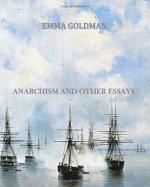|
This section contains 13,475 words (approx. 45 pages at 300 words per page) |

|

Overview
History
Theory in Depth
Theory in Action
Analysis and Critical Response
Topics for Further Study
Bibliography
See Also
Overview
The political theory of anarchism revolves around the ideal of noncoercion. Born with the rise of the nation–states in the eighteenth century, anarchism has developed four major strains including muualism, anarcho–individualism, anarcho–socialism, and anarcho–communism. In the late twentieth century, anarchism has been adapted to the student, women's, and environmentalist movements, among others. Anarchism has spawned experimental communities, peaceful protest, violent rebellion, and a wide and varied literature dedicated to the achievement of human liberty.
History
Popular use of the term "anarchy" tends to portray an image of chaos, of bombs and fires and looting, of crisis overtaking order. Hollywood dystopias and fringe rock bands have played into this stereotype with glee. Although some anarchists desired political revolution over political reform, many advocated peace. Equating...
|
This section contains 13,475 words (approx. 45 pages at 300 words per page) |

|


